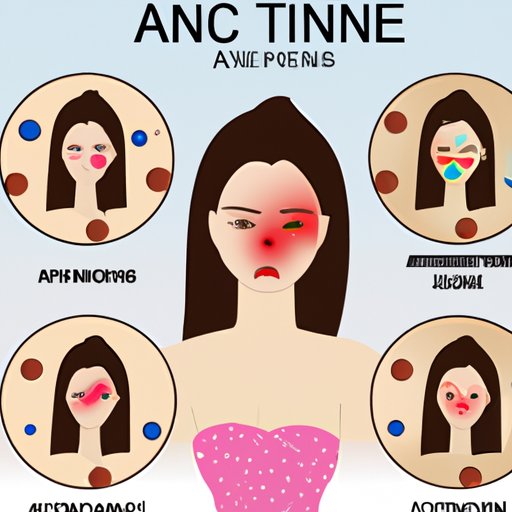Introduction
Acne is a common skin condition that affects millions of people worldwide. It is caused by a combination of factors, including hormones, genetics and lifestyle choices. While there are many treatments available, some people may find that traditional methods don’t work for them. This is where alternative treatments such as zinc come in. In this article, we will explore the potential benefits of using zinc to treat acne, the science behind it, and how to use it effectively.

Examining the Benefits of Zinc for Acne Treatment
Zinc is an essential mineral that plays a role in many bodily functions. It is found naturally in foods like seafood, nuts, whole grains, and dairy products. Zinc has anti-inflammatory properties, which makes it an appealing option for treating acne. In addition, it helps to regulate sebum production, which is another factor in acne.
How does zinc help reduce inflammation? Studies have shown that zinc can reduce inflammation in the skin by suppressing the release of pro-inflammatory cytokines. This helps to reduce redness and swelling associated with acne. Additionally, zinc can reduce the growth of bacteria on the skin, which can further reduce acne flare-ups.
What are the other potential benefits of zinc for acne sufferers? Zinc can also help to improve wound healing, reduce scarring, and brighten the skin. It may also be useful for treating other skin conditions, such as eczema and psoriasis.

Exploring the Science Behind Zinc and Acne Reduction
What is the scientific evidence that zinc can help reduce acne? Several studies have examined the effects of zinc on acne and have found that it can be effective in reducing symptoms. One study found that taking 30mg of zinc gluconate daily for eight weeks significantly reduced acne severity in participants. Another study found that applying a topical gel containing 5% zinc sulfate twice daily for six weeks improved acne lesions.
What other skin care products can be used in combination with zinc to further reduce acne? There are a variety of over-the-counter products that can be used in conjunction with zinc to help reduce acne. These include cleansers, exfoliators, toners, moisturizers, and spot treatments. It is important to choose products specifically formulated for acne-prone skin in order to avoid irritation.

Investigating How to Use Zinc to Treat Acne
What forms of zinc are available for treating acne? Zinc is available in various forms, including tablets, capsules, creams, gels, and ointments. It is important to discuss with your doctor or dermatologist which form would be most appropriate for you.
How should zinc be applied to the skin? If you are using a cream, gel, or ointment, it should be applied directly to the affected areas of the skin. It is important to avoid contact with the eyes and mouth. If you are taking oral supplements, it is important to follow the instructions on the package.
How much zinc should be used and how often? The amount and frequency of zinc use will vary depending on the type of product being used. Generally speaking, topical products should be used twice daily, while oral supplements should be taken once or twice daily. It is important to speak to a doctor or pharmacist before starting any new treatment.
Could Zinc Be the Answer to Your Acne Woes?
What types of acne respond best to zinc treatment? Zinc has been found to be effective in treating mild to moderate cases of acne. However, it may not be suitable for more severe cases. It is important to talk to your doctor or dermatologist about the best course of treatment for your individual case.
What are the potential side effects of using zinc for acne? As with any medication, there is a risk of side effects when using zinc for acne. These can include dryness, redness, itching, and irritation. It is important to speak to a doctor if any of these symptoms occur.
Zinc: A Potential Solution for Acne Sufferers
What are the pros and cons of using zinc for acne? The main benefit of using zinc for acne is its ability to reduce inflammation, reduce bacteria growth, and improve wound healing. Additionally, it is generally well tolerated and has few side effects. On the downside, it may not be suitable for more severe cases of acne and can cause dryness and irritation in some people.
Are there any other treatments or lifestyle changes that can be used in conjunction with zinc to improve acne? Yes, there are a number of other treatments and lifestyle changes that can help to improve acne. These include using oil-free cleansers and moisturizers, avoiding harsh scrubs and exfoliators, and eating a healthy diet. Additionally, drinking plenty of water and getting enough sleep can help to improve overall skin health.
Conclusion
In conclusion, zinc has been found to be an effective treatment for mild to moderate cases of acne. It can help to reduce inflammation, reduce bacteria growth, and improve wound healing. Additionally, it is generally well tolerated and has few side effects. However, it may not be suitable for more severe cases of acne and can cause dryness and irritation in some people. Therefore, it is important to discuss the best course of treatment with your doctor or dermatologist.


